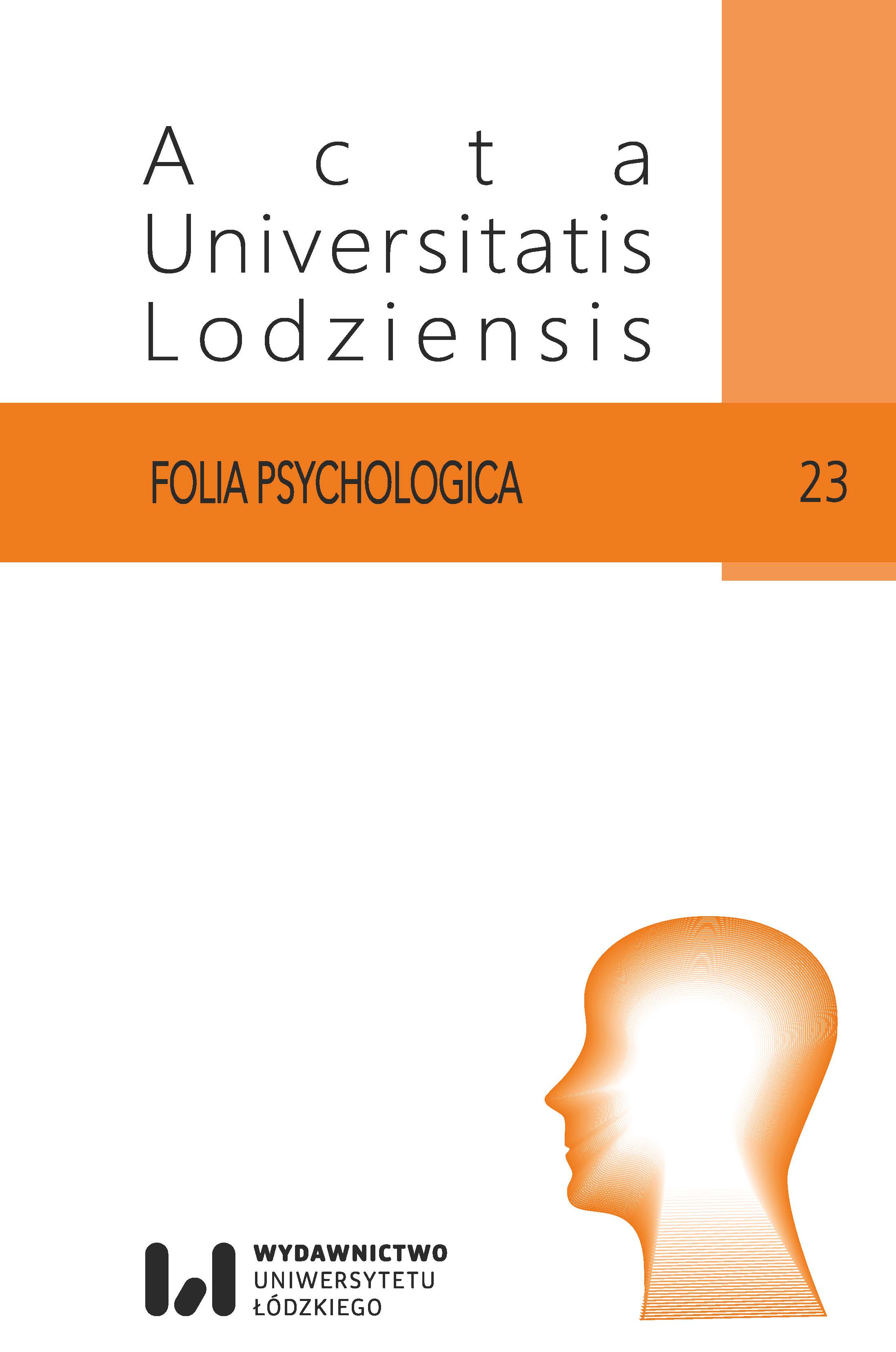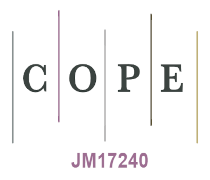Social skills and values – the role of intelligence
DOI:
https://doi.org/10.18778/1427-969X.23.05Keywords:
social skills, values, intelligence, MensaAbstract
The study analyzed whether intelligence differentiates social competences (in self-reports and peer assessments), value importance, and the relationship between values and social skills. 56 members of Polish Mensa and 57 people from the control group completed on-line the PVQ-RR (values) and the PROKOS (skills) questionnaires. Their skills were also assessed on-line by their friends using a modified version of the PROKOS. Mensa members rated their cooperative skills lower and tended to rate societal skills lower and assertive skills higher than the control group, but there were no differences in peer assessments. Among Mensa members self-assessments of skills (besides social and assertive) were lower than peer assessments. Mensa members significantly less identified with universal values and valued social values lower than the control group. In the control group, the self-rated competences were associated with Social-Focused and Self-Focused values. Among Mensa members, values did not correlate with self-rated social skills.
References
Argyle M. (1999). Psychologia stosunków międzyludzkich. Warszawa: Wydawnictwo Naukowe PWN.
Google Scholar
Barnett L.A., Fiscella J. (1985). A child by any other name… A comparison of the playfulness of gifted and nongifted children. Gifted Child Quarterly, 29, 61–66. https://doi.org/10.1177/001698628502900203
Google Scholar
DOI: https://doi.org/10.1177/001698628502900203
Baudson T.G. (2016). The mad genius stereotype: Still alive and well. Frontiers in Psychology, 7. https://doi.org/10.3389/fpsyg.2016.00368
Google Scholar
DOI: https://doi.org/10.3389/fpsyg.2016.00368
Boczkowska M. (2016). Wartości osobiste preferowane przez młodzież gimnazjalną a wybrane wskaźniki socjodemograficzne. Lubelski Rocznik Pedagogiczny, 35, 223–240. https://doi.org/10.17951/lrp.2016.35.3.223
Google Scholar
DOI: https://doi.org/10.17951/lrp.2016.35.3.223
Byrne B.M. (2010). Structural equation modeling with Amos: Basic concepts, applications, and programming. New York: Taylor and Francis Group.
Google Scholar
Cieciuch J. (2013). Kształtowanie się systemu wartości od dzieciństwa do wczesnej dorosłości. Warszawa: Liberi Libri.
Google Scholar
Cieciuch J. (2013a). Pomiar wartości w zmodyfikowanym modelu Shaloma Schwartza. Psychologia Społeczna, 8, 22–41.
Google Scholar
Cieciuch J., Schwartz S.H. (2018). Pomiar wartości w kołowym modelu Schwartza. W: H. Gasiul (red.), Metody badania emocji i motywacji (307–334). Warszawa: Wydawnictwo Difin.
Google Scholar
Çitil M., Özkubat U. (2020). The comparison of the social skills, problem behaviours and academic competence of gifted students and their non-gifted peers. International Journal of Progressive Education 2020, 16, 296–312. https://doi.org/10.29329/ijpe.2020.280.18
Google Scholar
DOI: https://doi.org/10.29329/ijpe.2020.280.18
Czerniawska M. (1995). Inteligencja a system wartości: Studium psychologiczne. Białystok: Trans Humana.
Google Scholar
Dauber S.L., Benbow C.P. (1990). Aspects of personality and peer relations of extremely talented adolescents. Gifted Child Quarterly, 34, 10–14. https://doi.org/10.1177/001698629003400103
Google Scholar
DOI: https://doi.org/10.1177/001698629003400103
George D., Mallery P. (2010). SPSS for windows step by step: A simple guide and reference 17.0 update. Boston: Pearson.
Google Scholar
Gil-Madrona P., Samalot-Rivera A., Kozub F.M. (2016). Acquisition and transfer of values and social skills through a physical education program focused in the affective domain. Motricidade, 12, 32–38. https://doi.org/10.6063/motricidade.6502
Google Scholar
DOI: https://doi.org/10.6063/motricidade.6502
Hair J.F., Black W.C., Babin B.J., Anderson R.E. (2010). Multivariate data analysis. New York: Pearson.
Google Scholar
Hogan H.W., Mookherjee H.N. (1981). Values and selected antecedents. The Journal of Social Psychology, 113, 29–35. https://doi.org/10.1080/00224545.1981.9924346
Google Scholar
DOI: https://doi.org/10.1080/00224545.1981.9924346
Jakubowska U. (1996). Wokół pojęcia „kompetencja społeczna” – ujęcie komunikacyjne. Przegląd Psychologiczny, 39, 29–40.
Google Scholar
Karpinski R.I., Kolb A.M.K., Tetreault N.A., Borowski T.B. (2018). High intelligence: A risk factor for psychological and physiological overexcitabilities. Intelligence, 66, 8–23. https://doi.org/10.1016/j.intell.2017.09.001
Google Scholar
DOI: https://doi.org/10.1016/j.intell.2017.09.001
Kerr B., Colangelo N., Gaeth J. (1988). Gifted adolescents’ attitudes toward their giftedness. Gifted Child Quarterly, 32, 245–247. https://doi.org/10.1177/001698628803200201
Google Scholar
DOI: https://doi.org/10.1177/001698628803200201
Knopp K.A. (2013). Kompetencje społeczne – pomiar i aplikacja praktyczna. Ośrodek Rozwoju Edukacji. https://www.researchgate.net/publication/313877703_Kompetencje_spoleczne_-_pomiar_i_aplikacja_praktyczna/ (dostęp: 10 listopada 2022).
Google Scholar
Lynn R. (2010). In Italy, north–south differences in IQ predict differences in income, education, infant mortality, stature, and literacy. Intelligence, 38, 93–100. https://doi.org/10.1016/j.intell.2009.07.004
Google Scholar
DOI: https://doi.org/10.1016/j.intell.2009.07.004
MacArthur H., Shields S.A. (2014). Hollingworth, Leta S. (1886–1939). W: R.N. Cautin, S.O. Lilienfeld (eds.), The Encyclopaedia of Clinical Psychology. https://doi.org/10.1002/9781118625392.wbecp123
Google Scholar
DOI: https://doi.org/10.1002/9781118625392.wbecp123
Martínez I., García J.F. (2008). Internalization of values and self-esteem among Brazilian teenagers from authoritative, indulgent, authoritarian, and neglectful homes. Family Therapy, 35, 43–59.
Google Scholar
Martowska K. (2012). Psychologiczne uwarunkowania kompetencji społecznych. Warszawa: Liberi Libri.
Google Scholar
Matczak A. (1994). Diagnoza intelektu. Warszawa: Wydawnictwo Instytutu Psychologii.
Google Scholar
Matczak A. (2001). Kwestionariusz Kompetencji Społecznych KKS. Podręcznik. Warszawa: Pracownia Testów Psychologicznych Polskiego Towarzystwa Psychologicznego.
Google Scholar
Matczak A. (2001a). Różne oblicza inteligencji: funkcjonowanie intelektu a osobowość. Studia Psychologica, 2, 157–174.
Google Scholar
Matczak A., Martowska K. (2009). Instrumental and motivational determinants of social competencies. W: A. Matczak (red.), Determinants of social and emotional competencies (13–35). Warszawa: Wydawnictwo Uniwersytetu Kardynała Stefana Wyszyńskiego.
Google Scholar
Matczak A., Martowska K. (2013). Profil Kompetencji Społecznych. PROKOS. Podręcznik. Warszawa: Pracownia Testów Psychologicznych Polskiego Towarzystwa Psychologicznego.
Google Scholar
Matczak A., Jaworowska A., Szustrowa T., Ciechanowicz A. (1995). Bateria testów APIS‑Z. Podręcznik. Warszawa: Pracownia Testów Psychologicznych Polskiego Towarzystwa Psychologicznego.
Google Scholar
Milcarz M.M. (2019). Uczucia moralne, wartości i przekonania postkrytyczne członków stowarzyszenia Mensa Polska – analiza porównawcza. Polskie Forum Psychologiczne, 24, 42–56.
Google Scholar
Nyborg H., Jensen A.R. (2001). Occupation and income related to psychometric g. Intelligence, 29, 45–55. https://doi.org/10.1016/S0160-2896(00)00042-8
Google Scholar
DOI: https://doi.org/10.1016/S0160-2896(00)00042-8
Rim Y. (1984). Importance of values according to personality, intelligence and sex. Personality and Individual Differences, 5, 245–246. https://doi.org/10.1016/0191-8869(84)90058-8
Google Scholar
DOI: https://doi.org/10.1016/0191-8869(84)90058-8
Sapsaglam Ö., Ömeroglu E. (2016). Examining the effect of social values education program being applied to nursery school students upon acquiring social skills. Educational Research and Reviews, 11, 1262–1271.
Google Scholar
Schmidt F., Hunter J. (1998). The validity and utility of selection methods in personnel psychology. Psychological Bulletin, 124, 262–274. https://doi.org/10.1037/0033-2909.124.2.262
Google Scholar
DOI: https://doi.org/10.1037/0033-2909.124.2.262
Schwartz S.H. (1977). Normative influences on altruism. Advances in Experimental Social Psychology, 10, 221–279. https://doi.org/10.1016/S0065-2601(08)60358-5
Google Scholar
DOI: https://doi.org/10.1016/S0065-2601(08)60358-5
Schwartz S.H. (2006). Basic human values: Theory measurement and applications. Revue francaise de sociologie, 47, 929–968. https://doi.org/10.3917/rfs.474.0929
Google Scholar
DOI: https://doi.org/10.3917/rfs.474.0929
Schwartz S.H., Cieciuch J., Vecchione M., Davidov E., Fischer R., Beierlein C., Ramos A., Verkasalo M., Lönnqvist J.-E., Demirutku K., Dirilen-Gumus O., Konty M. (2012). Refining the theory of basic individual values. Journal of Personality and Social Psychology, 103, 663–688. https://doi.org/10.1037/a0029393
Google Scholar
DOI: https://doi.org/10.1037/a0029393
Sękowski A.E. (2001). Współczesne tendencje w badaniach wybitnych zdolności. Roczniki Psychologiczne, 4, 243–255.
Google Scholar
Sękowski A.E., Łubianka B. (2009). Preferencja wartości uczniów zdolnych. Przegląd Psychologiczny, 52, 409–432.
Google Scholar
Sortheix F.M., Schwartz S.H. (2017), Values that underlie and undermine well-being: Variability across countries. European Journal of Personality, 31, 187–201. https://doi.org/10.1002/per.2096
Google Scholar
DOI: https://doi.org/10.1002/per.2096
Southern M.L., Plant W.T. (1968). Personality characteristics of very bright adults. The Journal of Social Psychology, 75, 119–126. https://doi.org/10.1080/00224545.1968.9712481
Google Scholar
DOI: https://doi.org/10.1080/00224545.1968.9712481
Tyszkowa M. (1990). Zdolności, osobowość i działalność uczniów. Warszawa: Państwowe Wydawnictwo Naukowe.
Google Scholar
Zalewska A.M. (1998). Ważność wartości społecznych wśród młodzieży uczącej się. Forum Psychologiczne, 3, 144–165.
Google Scholar
Zalewska A.M. (2000). Adaptacja kwestionariusza „Orientacja na wartości zawodowe” Seiferta i Bergmanna do warunków polskich. Studia Psychologiczne, 38, 57–77.
Google Scholar
Downloads
Published
How to Cite
Issue
Section
License

This work is licensed under a Creative Commons Attribution-NonCommercial-NoDerivatives 4.0 International License.









